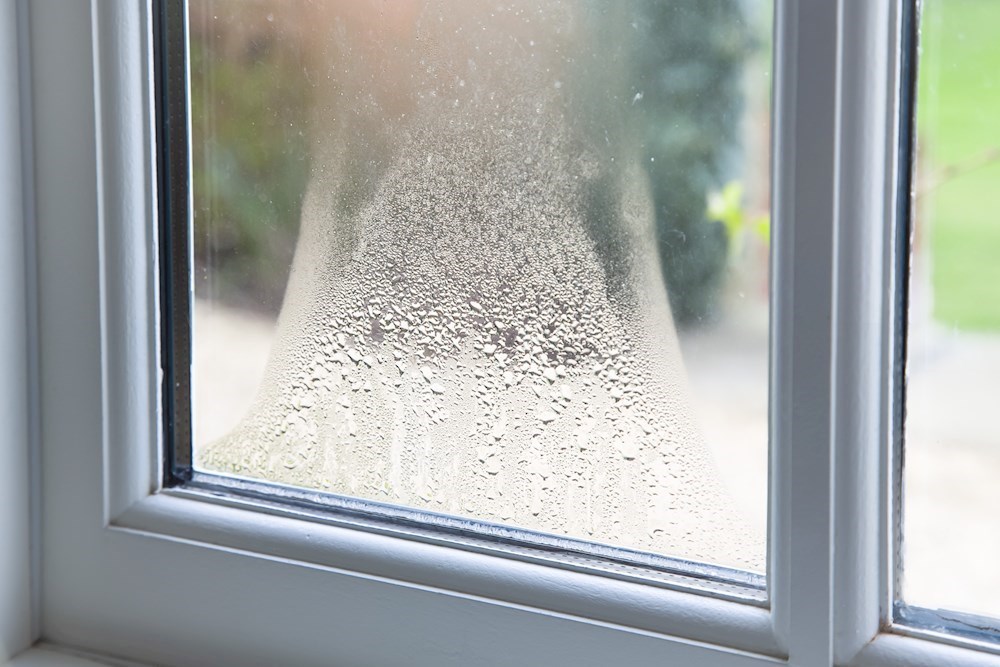Condensation on the windows? What to do about it
Last updated: 19-11-2024
~ 4 min. read
If you ever have to deal with condensation on the windows, it can have several causes. In principle, condensation is a natural phenomenon. It occurs when there is (much) moisture in a room that cannot evaporate, for example because there is not enough ventilation. The moisture in the form of warm air then condenses on cold surfaces such as windows and mirrors.
Often the reason for condensation is moisture that occurs, for example, while cooking or showering. In principle, condensation is harmless but annoying. How you can avoid condensation on the windows and what the possible causes are, you can read in this article.

Condensation on windows on the outside
Are you dealing with condensation on your windows on the outside? Don't worry about this. In fact, it is a good sign. It has to do with the high insulation value of your double glazing. Usually you only have to deal with it in the morning. The outside temperature then quickly becomes higher than the temperature of the windows. Together with the air humidity that is relatively high in the morning, this causes condensation to form. This condensation disappears on its own after a short time. How quickly this happens depends on the sunny side and the air flow present.
Condensation on windows from the inside
As you have read above, condensation is a natural phenomenon. A little condensation is not a big deal. However, if your window or windows are constantly soaking wet or completely fogged up, it can have unpleasant consequences. Wooden window frames can rot, wallpaper and paint can peel off and mold can develop. It will also start to smell musty. These scenarios are best avoided. It's better for your wallet and your health. An unhealthy environment can lead to nausea, headaches, itchy nose or eyes and sore throats.
Condensation between the windows
If you have double glazing and you notice condensation between the windows, it unfortunately means that the double glazing is leaking. The only remedy is to have the double glazing replaced, for example by the glazier you arrange through Zoofy. Possibly the replacement of the double glazing is covered by the warranty or by the building insurance. The production date, from which you can see how old the double glazing is, can be found on the aluminum profile between the glass layers.
Temporary solutions to avoid condensation on windows
There are a number of measures you can easily implement yourself and, if you are lucky, they significantly reduce condensation. What you can try are the following things:
Airing and airing again. To do this, open all windows (and doors) against each other for at least fifteen minutes to half an hour every day. If possible, always leave a window ajar.
Leave the window of your bedroom ajar at night. On average, a person loses two liters of moisture at night.
Always turn on the cooker hood when cooking.
Open the bathroom window not only after showering but also while showering.
Clean the air vents regularly and don't put anything in front of them (keep them clear).
Heat your home sufficiently to an indoor temperature of at least 15 °C.
Permanent solution for condensation on the windows
Preventing condensation on your windows is not always easy, and every home and every situation requires a different solution. Most people who are bothered by condensation want a permanent solution. In addition to the above temporary solutions, it is best to investigate whether the following things in your home are in order or can be improved:
Cavity wall insulation*
floor insulation*
double glazing*
ventilation systems (automatic)
Replacement of window frames
On a number of measures (marked with an *) you can get a government subsidy. You must then take two insulation measures.
Not only will these measures lead to less condensation, they will also make your house more comfortable. Moreover, such measures increase the value of your house.